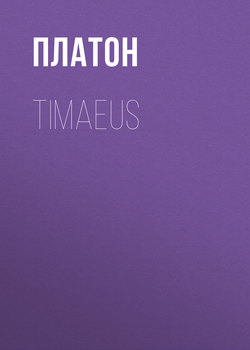Timaeus

Реклама. ООО «ЛитРес», ИНН: 7719571260.
Оглавление
Платон. Timaeus
INTRODUCTION AND ANALYSIS
Section 1
Section 2
Section 3
Section 4
Section 5
Section 6
Section 7
Section 8
TIMAEUS
Отрывок из книги
Socrates begins the Timaeus with a summary of the Republic. He lightly touches upon a few points, – the division of labour and distribution of the citizens into classes, the double nature and training of the guardians, the community of property and of women and children. But he makes no mention of the second education, or of the government of philosophers.
And now he desires to see the ideal State set in motion; he would like to know how she behaved in some great struggle. But he is unable to invent such a narrative himself; and he is afraid that the poets are equally incapable; for, although he pretends to have nothing to say against them, he remarks that they are a tribe of imitators, who can only describe what they have seen. And he fears that the Sophists, who are plentifully supplied with graces of speech, in their erratic way of life having never had a city or house of their own, may through want of experience err in their conception of philosophers and statesmen. 'And therefore to you I turn, Timaeus, citizen of Locris, who are at once a philosopher and a statesman, and to you, Critias, whom all Athenians know to be similarly accomplished, and to Hermocrates, who is also fitted by nature and education to share in our discourse.'
.....
In the next place, we may observe that there are different kinds of fire – (1) flame, (2) light that burns not, (3) the red heat of the embers of fire. And there are varieties of air, as for example, the pure aether, the opaque mist, and other nameless forms. Water, again, is of two kinds, liquid and fusile. The liquid is composed of small and unequal particles, the fusile of large and uniform particles and is more solid, but nevertheless melts at the approach of fire, and then spreads upon the earth. When the substance cools, the fire passes into the air, which is displaced, and forces together and condenses the liquid mass. This process is called cooling and congealment. Of the fusile kinds the fairest and heaviest is gold; this is hardened by filtration through rock, and is of a bright yellow colour. A shoot of gold which is darker and denser than the rest is called adamant. Another kind is called copper, which is harder and yet lighter because the interstices are larger than in gold. There is mingled with it a fine and small portion of earth which comes out in the form of rust. These are a few of the conjectures which philosophy forms, when, leaving the eternal nature, she turns for innocent recreation to consider the truths of generation.
Having considered objects of sense, we now pass on to sensation. But we cannot explain sensation without explaining the nature of flesh and of the mortal soul; and as we cannot treat of both together, in order that we may proceed at once to the sensations we must assume the existence of body and soul.
.....